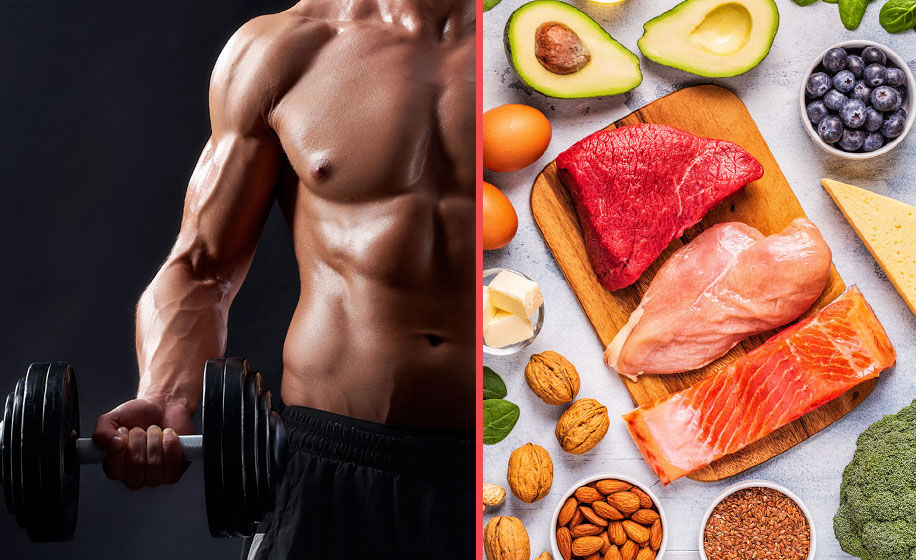Building muscle is a goal for many individuals seeking to improve their physical fitness, appearance, and overall health. While a well-structured exercise program is crucial for muscle growth, nutrition plays an equally important role. Consuming the right muscle-building foods provides the necessary nutrients to support muscle growth, repair, and maintenance. This comprehensive guide will explore the key macronutrients and micronutrients required for muscle building and highlight the top foods that promote growth and strength.
I. Macronutrients for Muscle Building
- Protein
Protein is the most critical macronutrient for muscle growth. It is made up of amino acids, the building blocks of muscle tissue. Consuming adequate protein ensures the body has the necessary resources to repair and build muscle following exercise.
- Carbohydrates
Carbohydrates provide energy for exercise and fuel the body’s recovery process. Consuming sufficient carbohydrates replenishes glycogen stores, prevents muscle breakdown, and supports the release of insulin, a hormone that promotes muscle growth.
- Fats
Fats play a vital role in hormone production, including testosterone, which is crucial for muscle growth. They also provide energy, support nutrient absorption, and reduce inflammation, promoting muscle recovery.
II. Micronutrients for Muscle Building
- Vitamins
Certain vitamins, such as vitamins D, C, and E, contribute to muscle building by promoting hormone production, supporting protein synthesis, and reducing oxidative stress.
- Minerals
Minerals like calcium, magnesium, and zinc are essential for muscle function, energy production, and hormone regulation, all of which contribute to muscle growth.
III. Top Muscle-Building Foods
- Lean meats
- Chicken breast: A low-fat, high-quality protein source, chicken breast is packed with essential amino acids that promote muscle growth and recovery.
- Turkey: Similar to chicken, turkey is a lean protein source that provides essential nutrients for muscle building.
- Lean beef: Rich in protein, iron, and zinc, lean beef supports muscle growth and provides essential micronutrients that contribute to energy production and hormone regulation.
- Fish and seafood
- Salmon: High in protein and omega-3 fatty acids, salmon supports muscle growth, reduces inflammation, and promotes overall health.
- Tuna: A lean protein source, tuna is rich in vitamins and minerals, including B vitamins and selenium, which support muscle function and recovery.
- Shrimp: Low in calories and high in protein, shrimp is an excellent addition to a muscle-building diet.
- Dairy
- Greek yogurt: Packed with protein and calcium, Greek yogurt supports muscle growth and bone health.
- Cottage cheese: High in casein protein, which is slowly absorbed, cottage cheese provides a steady supply of amino acids to support muscle growth and recovery.
- Milk: A source of both whey and casein protein, milk provides essential nutrients for muscle building and bone health.
- Plant-based proteins
- Quinoa: A complete protein containing all essential amino acids, quinoa is an excellent option for plant-based muscle building.
- Lentils: Rich in protein and fiber, lentils support muscle growth and provide sustained energy.
- Tofu: Made from soybeans, tofu is a complete protein that supports muscle growth and provides essential nutrients, such as calcium and iron.
- Nuts and seeds
- Almonds: High in protein, healthy fats, and vitamin E, almonds support muscle growth and overall health.
- Chia seeds: Rich in omega-3 fatty acids, protein, and fiber, chia seeds promote muscle recovery and overall health.
- Pumpkin seeds: Packed with protein, magnesium, and zinc, pumpkin seeds support muscle function and hormone regulation.
- Whole grains
- Brown rice: A slow-digesting carbohydrate, brown rice provides sustained energy for workouts and supports muscle recovery.
- Oats: Rich in complex carbohydrates, fiber, and protein, oats provide a steady source of energy and promote muscle growth.
- Whole grain bread: Paired with protein sources like lean meats or nut butter, whole grain bread contributes to a well-rounded muscle-building diet.
- Fruits and vegetables
- Spinach: Rich in iron, magnesium, and nitrates, spinach supports muscle function, energy production, and blood flow.
- Sweet potatoes: High in complex carbohydrates, fiber, and beta-carotene, sweet potatoes provide sustained energy and support muscle recovery.
- Berries: Packed with antioxidants, vitamins, and minerals, berries reduce inflammation and oxidative stress, promoting muscle recovery and overall health.
- Supplements
While whole foods should form the foundation of a muscle-building diet, supplements can provide additional support.
- Whey protein: A fast-digesting protein source, whey protein is ideal for post-workout recovery and can be easily added to shakes or smoothies.
- Casein protein: Slow-digesting casein protein is ideal for providing a steady supply of amino acids during periods of fasting, such as before bed.
- Creatine: A popular supplement for muscle building, creatine has been shown to improve strength, power, and lean muscle mass.
IV. Creating a Balanced Muscle-Building Diet
- Determine protein requirements
A general guideline for muscle-building protein intake is 1.2 to 2.2 grams of protein per kilogram of body weight per day. This range can be adjusted based on factors such as age, training intensity, and individual needs.
- Balance macronutrients
A balanced muscle-building diet should include a mix of protein, carbohydrates, and healthy fats. Aim for a macronutrient ratio of 40-60% carbohydrates, 25-35% protein, and 15-25% fat, adjusting as needed for personal preferences and goals.
- Prioritize nutrient timing
Consuming protein and carbohydrates within 30-60 minutes of exercise can optimize muscle recovery and growth. This post-workout window is crucial for replenishing glycogen stores and providing amino acids for muscle repair.
Conclusion
Muscle building is a multifaceted process that requires a balanced approach to nutrition and exercise. By consuming a variety of nutrient-rich muscle-building foods, individuals can provide their bodies with the essential macronutrients and micronutrients required for growth, repair, and maintenance. Tailoring one’s diet to meet individual needs and preferences, and prioritizing nutrient timing, can further enhance muscle-building efforts and lead to impressive results.
